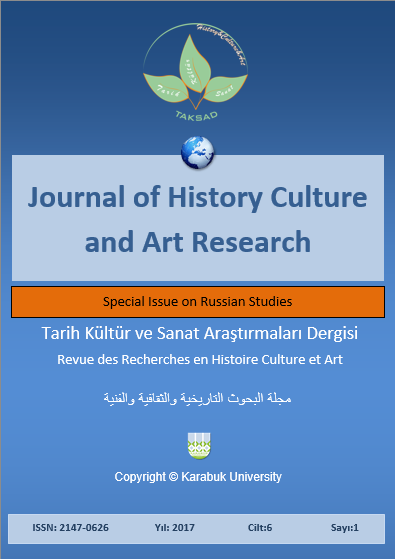Taxonomy of Values and Anti-Values: the Material of the Russian and German Phraseology
DOI:
https://doi.org/10.7596/taksad.v6i5.1251Keywords:
Linguistics, English language, Education, Sociology, Language, Taxonomy of values and anti-values, Axiological scale, Taxonomic model, Axiological phraseological unit, Axiological approach, Teaching foreign languages.Abstract
At present, in terms of intercultural communication, the role of the axiological aspect in teaching foreign languages is growing. When thinking about the values and anti-values in the phraseology of Russian and German it is advisable to take into account their hierarchy which can be presented as the axiological scale. This investigation benefits from the following methods: axiological linguistic method, method of cognitive analysis, comparative method, processing of lexicographical sources. The result of the study is formation of the axiological scale and development on its basis of the taxonomic model of values and anti-values in the phraseology of the Russian and German languages. The taxonomic model of values and anti-values in the phraseology of the language allows submitting axiological hierarchy reflecting the inter-layer differentiation of values and anti-values represented by axiological phraseology. Axiological scale and taxonomic model of values and anti-values in the Russian and German phraseology can be used in linguistic axiological research of different languages.
References
Andreeva, E. A.; Mazitova, F. L. & Korneva, I. G. (2017). Formation of the value system of high school graduates through study of the axiological picture of the world in the language. Kazan pedagogical journal, 1, 106-108.
Andreyeva, Ye. A.; Mazitova, F. L. & Smirnova, M. A. (2015). Common and specific images of the Russian and German axiological phraseological units in the cultural codes. Journal of language and literature, 6(4), 380-384.
Anisimov, S. F. (1970). The real and imaginary values. Moscow.
Artemov, A. A. (2006). Philosophical experience in building value hierarchy. Problems of modern economy, 1-2, 51-53.
Bayramova, L. K. (2008). Interpretation of phraseology in dictionaries from the standpoint of cognitive science and axiology. Phraseology and cognitive science. In 2 v. V.1: Idiomatic and cognition / ed. by N.F. Alefirenko. Belgorod.
Belau, M. Yu. (2009). Verbal taxonomic model of the concept “Independent movement of the subject” in the modern English language. Dissertation of Philology. Tula.
Corrigan, R. (2009). Formularic language. Vol.1. Distribution and historical change. Amsterdam: John Benjamins Publishing Company.
Fakhrutdinova, A. V.; Mefodeva, M. A. & Zakirova, R. R. (2016). Moral education in Russia and India: A comparative analysis. Social Sciences, 11(15), 3765-3769.
Georgieva, O. N. (2010). Discourse representation of the ethnic specificity of the French and Russian sphere of concepts “BIEN” / “ДОБРО” and “MAL” / “ЗЛО”. Dissertation of Philology. Volgograd.
Guay, E. Yu. (2009). Axiological aspect of the English phraseography. Dissertation of Philology. Moscow.
Kushnir, O. N. (2010). Axiological base of the typology of linguistic cultural concepts. Category of values and culture (axiology, literature, language): Proceedings of scientific conference 13-15 May 2010. Vladikavkaz: Publishing House of the North Ossetian State University.
Maslow, A. (2002). Toward a psychology of being: religion, values and peak-experience. – Moscow: Eksmo-Press.
Merriam-Webster dictionary (2016). [Electronic Resource] URL: http://www.merriam-webster.com/dictionary/taxonomy (accessed on 20.10.16).
Valeev, A. A., Valeeva, L. A., & Sirazeeva, A. F. (2015). University Students’ Intercultural Competence Development in Foreign Language Teaching by Means of Axiological Approach. Review of European Studies, 7(4). 178-185. DOI: http://dx.doi.org/10.5539/res.v7n4p178
Zerkina, N. N.; Lomakina, E. A. & Kostina, N. N. (2015). Axiological linguistics and foreign language teaching. Procedia – social and behavioral sciences, 199, 254-260. DOI: https://doi.org/10.1016/j.sbspro.2015.07.514
Downloads
Published
How to Cite
Issue
Section
License
All papers licensed under Creative Commons 4.0 CC-BY.- Share — copy and redistribute the material in any medium or format
- Adapt — remix, transform, and build upon the material for any purpose, even commercially.
Under the following terms:
Attribution — You must give appropriate credit, provide a link to the license, and indicate if changes were made. You may do so in any reasonable manner, but not in any way that suggests the licensor endorses you or your use.
- No additional restrictions — You may not apply legal terms or technological measures that legally restrict others from doing anything the license permits.







